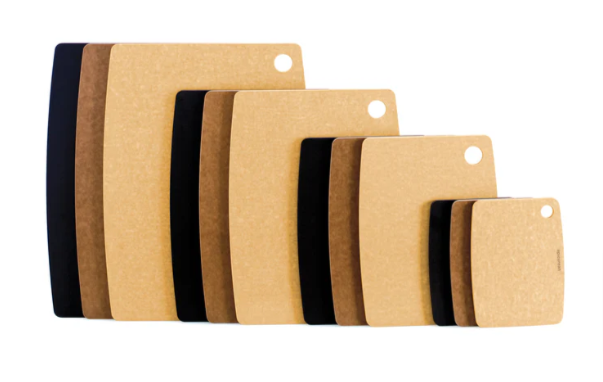Cutting boards are an essential tool in any kitchen, and choosing the right one can significantly impact food preparation. Among the many options available, Epicurean cutting boards have gained popularity for their durability and design. But are Epicurean cutting boards any good? In this guide, we will explore their features, benefits, and potential drawbacks to help you make an informed decision.
Understanding Epicurean Cutting Boards and Their Impact
Epicurean cutting boards are known for their composite material, made from wood fiber and resin. Unlike traditional wooden boards, these are lightweight, non-porous, and dishwasher-safe. Many professional chefs and home cooks appreciate their eco-friendly nature and knife-friendly surface. However, it is essential to understand their impact on kitchen efficiency and hygiene before deciding if they are the right fit for you.
Common Challenges with Cutting Boards
Despite their popularity, cutting boards come with several challenges. Here are some of the most common ones:
- Durability Concerns: Some boards warp or crack over time due to moisture exposure.
- Knife Damage: Hard surfaces can dull knives faster than expected.
- Bacterial Growth: Porous boards can harbor bacteria if not cleaned properly.
- Maintenance Requirements: Some boards need frequent oiling to maintain their quality.
- Cost Considerations: High-quality cutting boards can be expensive compared to cheaper alternatives.
- Size and Storage Issues: Large cutting boards may be challenging to store in small kitchens.
- Material Preferences: Some people prefer natural wood, while others opt for plastic or composite materials.
Why Solving These Issues Matters
Addressing these common issues is crucial to ensure kitchen hygiene, efficiency, and safety. A well-maintained, high-quality cutting board can:
- Reduce the risk of cross-contamination and foodborne illnesses.
- Prolong the life of your knives by providing a softer cutting surface.
- Make food preparation more convenient with the right size and weight.
- Save money in the long run by avoiding frequent replacements.
5 Actionable Tips for Choosing the Right Cutting Board
If you are considering an Epicurean cutting board or any other type, these tips can help you make the best choice:
- Consider the Material: Choose between wood, plastic, or composite based on your needs.
- Check for Knife Friendliness: Opt for a board that minimizes blade dulling.
- Ensure Easy Maintenance: Look for non-porous and dishwasher-safe options.
- Pick the Right Size: Ensure the board fits your kitchen space and cooking habits.
- Assess Durability: Invest in a board that resists warping and cracking.
Key Misconceptions About Epicurean Cutting Boards
There are several misconceptions about Epicurean cutting boards that need to be addressed:
- “They Are Too Expensive”: While they may have a higher initial cost, their durability makes them a cost-effective choice.
- “They Are Not Knife-Friendly”: Unlike glass or stone boards, Epicurean boards are designed to be gentler on knives.
- “They Require Special Maintenance”: These boards do not need regular oiling like wooden boards.
- “They Are Not Heat Resistant”: Epicurean boards can withstand moderate heat but should not be used as trivets.
How Choosing the Right Cutting Board Can Improve Your Kitchen Experience
Investing in a high-quality cutting board, like an Epicurean one, can lead to a better cooking experience. Benefits include:
- Faster and Safer Food Preparation: A stable cutting surface reduces the risk of accidents.
- Long-Lasting Performance: Durable materials mean fewer replacements and lower costs over time.
- Better Hygiene: Non-porous surfaces prevent bacteria buildup, ensuring safer food handling.
- Eco-Friendly Choice: Many Epicurean boards are made from sustainable materials.
Best Practices for Maintaining Your Cutting Board
To ensure longevity and hygiene, follow these best practices:
- Clean Properly: Wash with mild soap and water after each use. Avoid soaking in water.
- Sanitize Regularly: Use a mixture of vinegar and water to kill bacteria.
- Store Correctly: Keep in a dry place to prevent moisture damage.
- Avoid High Heat: Do not place hot pots or pans directly on the board.
The Importance of Ongoing Maintenance
A cutting board is not a one-time investment; ongoing care is necessary to keep it in optimal condition. Regular cleaning, proper storage, and periodic sanitization will ensure it remains safe and effective for years.
Related Article: The 8 Best Epicurean Cutting Boards for Your Kitchen
Conclusion
So, are Epicurean cutting boards any good? The answer depends on your needs and preferences. They offer durability, knife-friendliness, and hygiene benefits, making them a great choice for many kitchens. By understanding their advantages and proper maintenance, you can ensure a long-lasting and efficient cutting board experience.
FAQ’s
What makes Epicurean cutting boards different from traditional wooden boards?
Epicurean boards are made from wood composite, making them non-porous, dishwasher-safe, and durable.
Can Epicurean cutting boards be used for raw meat?
Yes, their non-porous surface prevents bacteria buildup, but it is best to use separate boards for raw meat and vegetables.
How do I clean an Epicurean cutting board?
Wash with soap and water, and sanitize with vinegar or hydrogen peroxide occasionally.
Are Epicurean cutting boards knife-friendly?
Yes, they are softer than glass or stone boards and help reduce blade dulling.
How long do Epicurean cutting boards last?
With proper care, they can last several years without warping or cracking.

